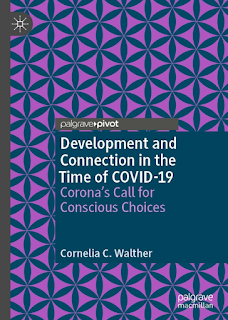This review was written by Eugene Kernes
Genre = Sociology
“We have a choice about the new normal that arises from these trying times. Seizing the power of this choice a all levels is possible only if we understand and optimize the multiple interplays that shape and connect them.” – Cornelia Walther, Front Matter, Page 9
“Replacing interpersonal exchanges with physical, mental, and emotional self-isolation is not a sustainable choice.” – Cornelia Walther, Chapter 1: Overall Context, Page 34
“But we did not listen; or rather, much was said and listened to, but little was done to translate words into action.” – Cornelia Walther, Chapter 1: Overall Context, Page 37
Excerpts with permission from author
Basic info on POZE: The POZE paradigm which underpins this article is based on the understanding that every person is a composition of multiple dimensions, which makes each individual a reflection of the multiple dimensions that shape the society which they are part of. (Walther 2020-a). This multidimensional logic and the four universal principles that apply within and throughout both, the personal and the collective realm – (Change, Connection, Continuity, Complementarity), is outlined hereafter as the point of departure of the subsequent argumentation. Awareness of the dynamics that derive from the constantly evolving continuum of aspirations, emotions, thoughts and action, or, people and planet, conditions sustainable individual change, personal leadership, and meaningful influence in the social sphere as needed to induce societal transformation dynamics that is conducive to resilience at the community and wider level.
To learn more about POZE, see link: https://pozebeingchange.wordpress.com/
Cornelia C Walther Linkedin: https://www.linkedin.com/in/corneliawalther/?originalSubdomain=ht
Overview:
COVID has changed routines and normal ways of living. There are different opportunities and choices on how to respond to the new normal. For many, the pandemic has given them time. The problem is knowing how to use it. Either for isolated mindless activities, or finding opportunities to connect with the rest of humanity. Some people responded to the pandemic by focusing on themselves, and protecting themselves. Not caring for the consequences of their behavior on others. Some responded to the pandemic by finding opportunities to connect with others. To relate and share. Caring for a diverse range of people. Everything is interconnected, with the possibility of even small actions sparking global change. The way every human interacts with each other, impacts their mental and immune system health. By creating belonging, even under stressful situations, can bring with it understanding and peace. The theme of the book is POZE, a word for inner peace. Which considers the dynamics between inside-out change and outside-in nurture.
No matter one’s background, everyone is at risk of getting sick from COVID-19. But, there are different circumstances that impact their exposure to the virus, and access to testing and treatment. Many people were left without a safety net as economic activity was severely reduced.
The basis of POZE is change and nurture. Change comes from internal dynamics of aspirations, emotions, thoughts, and behavior. On a larger social scale, societies interactive dynamics are individuals, institutions, countries, and Planet Earth. Nurture is an outside-in dynamic as interactions with others and the environment shapes decision making.
People are influenced by their past behavior. Shaping their future behavior. What is needed to figure out how to change behavior when interacting with the world, while having behavioral patterns which have a bases in memory and emotions. The pandemic has shocked change into the patterns, requiring different ways to behave. The new ways highlighted not only how tight social, economic, political, and environmental issues are, but also the social fissures that exist. There were diverse reactions, many of which were based on social factors such as ethnicity.
Humans tend to be social, and want to interact with others. But the pandemic prevented interaction, which has become a source of acute anxiety. Self-isolation is not a sustainable choice. The immune system is partly dependent on the mental state of the individual. Having poor mental health, and other internal factors, weakens the immune system which increases the risk of getting sick.
Everything is connected. Actions in an area, has implications on others. Small individual actions can create a chain reaction that impacts the planetary level. An interconnected and mutually reinforcing dynamics that shape human existence. Planetary equilibrium can become sustainable when it is understood and accepted that everything is connected and dependent on other contributing factors. Trying to consider the interest of others. To find ways to cooperate.
Cooperation places the individual where the individual can bring the most added value, to compliment the values of other individuals. Trust is needed for cooperation. Technology provides many additional monitoring capabilities. To know which policy and behavior are more appropriate, requires reliable statistics and facts. Along with reliable sharing of public response plans which allows citizens to monitor government. Confidence in science, public authorities, and media needs to be earned over time.
It takes more than just listening and knowing about a problem, it also takes action. To prepare to handle the problem when it arrives. There were warnings about a pandemic before COVID-19, but they were not acted upon. The virus itself is immobile, and decays when left alone. It is humans who are mobile, and can choose a course of action such as protection from the virus. Taking action is what gives humans power to overcome the virus, as individuals and collective.
Caveats?
There is a bit too much repetition of the main theme, POZE. Although it is seen though different understandings, they are too similar to have much added value. The author recognizes that people have diverse reactions and connect differently, but that can mean that those differences compete with each other. Promoting cooperation over competition, takes away the coordinating ability of competition. Its ability to discover better activities and behaviors for the individual and society.
